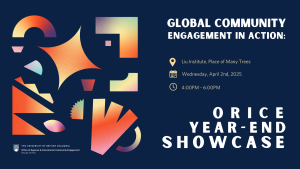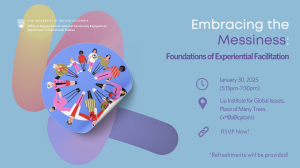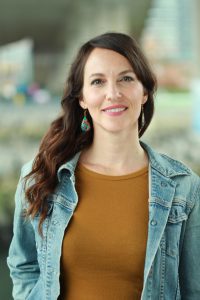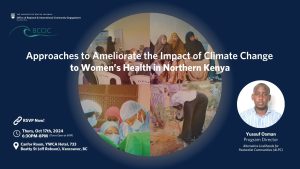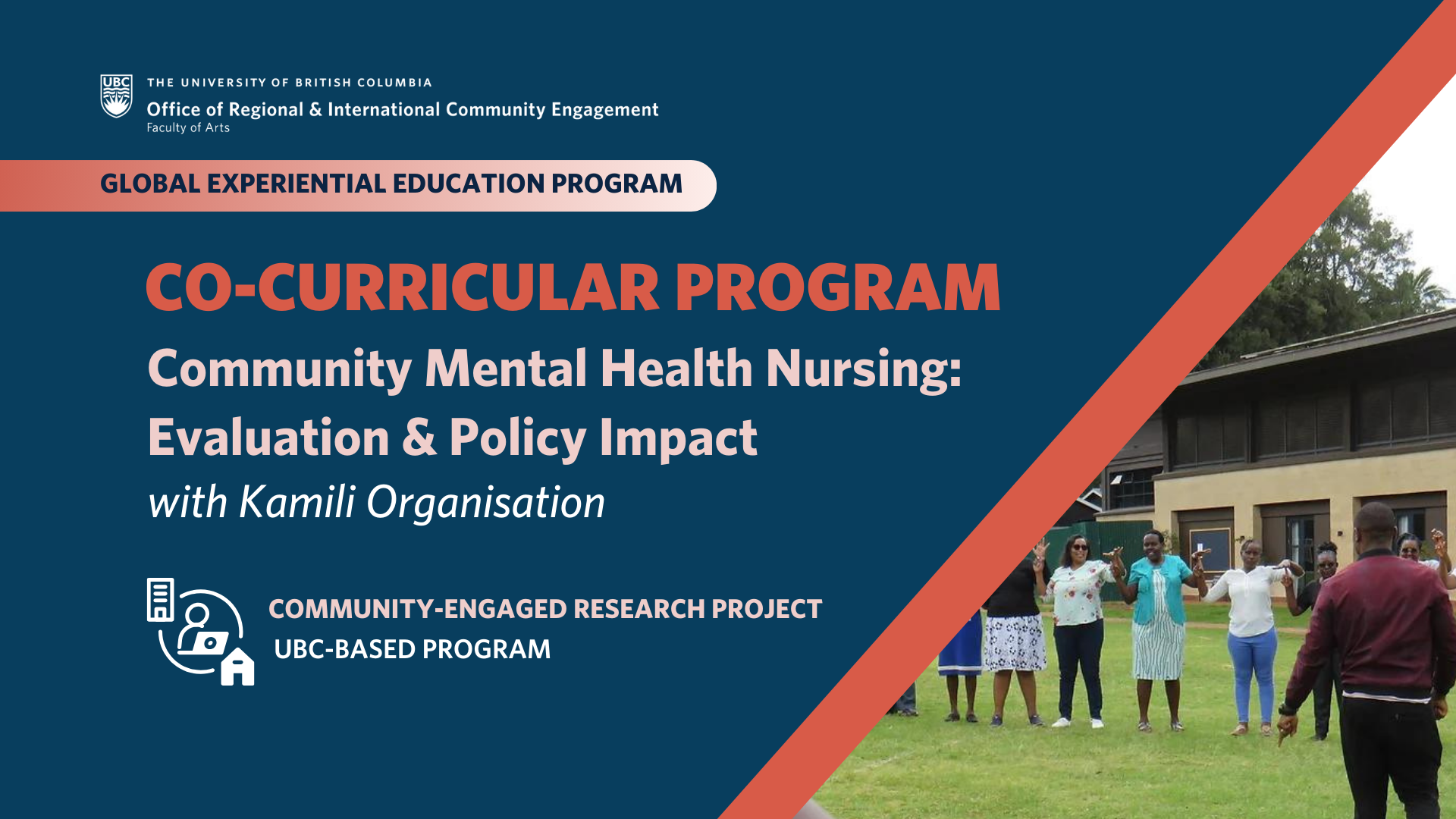Luís is a student majoring in International Relations with a minor in Law and Society. He worked on the SIP engagementship.
Noah Marsden
Noah is a recent BA graduate in Political Science and History. He worked on the BNBR engagementship.
Year-End Showcase: Global Community Engagement in Action
About the Presenters
GEEP groups
Wealth Development and Well-being: Assessing the Impact of AFRIpads’ Rural Employment Initiative Engagementship
This project focuses on assessing the direct impacts of employment at AFRIpads, a social enterprise where 80% of the workforce is women. AFRIpads seeks to understand how its decisions—such as locating its factory in a rural area, prioritizing female employment, and providing healthcare and pension benefits—affect individuals and households. Running from October 2024 to April 2025, this engagementship involves refining research questions, reviewing past studies, designing research methodologies, and developing data collection tools for a future study. The project critically examines the intersections of economic growth and social development, incorporating African scholarship and methodologies. Building on a 2023 survey analyzing economic changes around AFRIpads’ factory, this research further explores the broader social and economic impacts of their work.
AFRIpads aims to provide women and girls with a sustainable solution for managing their periods with comfort and dignity. Their mission is to empower through business, innovation, and opportunity to move closer to gender equality.
Inclusion Policy & Mechanism Analysis in Kenya with Basic Needs Basic Rights Engagementship
This project focuses on a desk research initiative analyzing Kenya’s inclusion policies, particularly those related to disability and mental health, to assess implementation mechanisms, monitoring, and public data availability. The findings will provide critical context for Basic Needs Basic Rights (BNBR) as they refine their organizational priorities, develop policy briefs, and guide future research. Running from October to December 2024, this engagementship involves environmental scans, literature reviews, and policy analysis, culminating in a comprehensive report on policy effectiveness and alignment with BNBR’s mission.
BNBR is a leading Kenyan NGO dedicated to mental health and development, integrating psychosocial support, community empowerment, and policy advocacy. As part of its five-year strategic plan, BNBR is prioritizing research-driven initiatives, continuing its partnership with ORICE to enhance evidence-based decision-making and advocacy efforts.
Community Mental Health Nursing: Evaluation & Policy Impact with Kamili Organisation Engagementship
Kamili Organisation seeks to evaluate the impact of its specialized mental health training for nurses, examining the facilitators, barriers, and effects of implementing their knowledge at their home sites. This one-term engagementship (January–April 2025) involves refining evaluation questions, reviewing program materials, conducting literature and policy scans, and developing data collection tools for a future study.
Kamili has trained 156 nurses across 44 of Kenya’s 47 counties, equipping them with community-based mental health care skills to improve accessibility and affordability. The organization operates over 30 clinics, providing diagnosis, treatment, psychosocial support, and community education to reduce mental health stigma.
Scholars in Prison Engagementship
This co-curricular project is a collaboration between the UBC Human Rights Collective (HRC) and the global Scholars at Risk (SAR) Network, supporting SAR’s Scholars in Prison Project. Over two semesters, students are engaging in human rights research and advocacy for imprisoned scholars in Iran and Belarus. In the first semester, they analyzed political, legal, and social contexts, tracked advocacy efforts, and established media monitoring protocols. In the second semester, they are implementing informed advocacy strategies in consultation with SAR and HRC, with past efforts including government petitions, awareness events, and policy submissions. Throughout the project, students will critically engage with issues of power, positionality, and human rights discourse. In late March, students will travel to Washington, DC for SAR’s US Student Advocacy Days 2025, an immersive opportunity to engage with other students, faculty, and a community of activists working to promote and protect academic freedom and the human rights of wrongfully imprisoned scholars.
Scholars at Risk (SAR) is an international network dedicated to protecting scholars and promoting academic freedom through advisory services, advocacy, and monitoring of threats to higher education. Their Practitioners-at-Risk program provides temporary academic positions for scholars facing grave threats, allowing them to continue their work until conditions improve.
RSVP now!
Embracing the Messiness: Foundations of Experiential Facilitation
EVENT DETAILS
eventDate: Thursday, January 30th, 2025
Time: 5:15-7:30PM
event5:15 PM - 5:30 PM - Check In & Snacks
5:30 - 7:30PM - Event
7:30 - 8:00PM - Optional Net
location_onLiu Institute for Global Issues
6476 NW Marine Dr, Vancouver, BC, V6T 1Z2, Canada
EVENT DETAILS
Date: Thursday, January 30th, 2025
Time: 5:15-7:30PM
5:15 PM - 5:30 PM - Check In & Snacks
5:30 - 7:30PM - Event
7:30 - 8:00PM - Optional Net
Liu Institute for Global Issues
6476 NW Marine Dr, Vancouver, BC, V6T 1Z2, Canada
About
Join us for an engaging, interactive workshop for students and community members who are interested in building their skills for creative facilitation and experiential forms of teaching. This session will offer helpful ideas for facilitation in settings such as classrooms and community research and activism spaces. The session will be led by the three authors of The Handbook of Facilitation for Community Transformation, Kari Grain (Faculty member in UBC Education, author of Critical Hope), Khari Wendell McClelland (Musician and Black liberation activist), and Tara Mahoney (climate activist and community engaged researcher). All participants will be gifted a free copy of Facilitation for Community Transformation for your own use in teaching and community engagement. Come and enjoy a great session and some free snacks and refreshments. All levels of facilitation experience are welcome.
This event is hosted in collaboration by the Office of Regional and International Community Engagement and the Department of Educational Studies, UBC, and made possible through funding provided by the UBC Teaching and Learning Enhancement Fund (TLEF).
About the Speakers
Dr. Kari Grain, Author and Lecturer
Dr. Kari Grain is the author of Critical Hope and teaches at the University of British Columbia in the Faculty of Education, where she leads the Master’s in Adult Learning and Global Change (ALGC) Program. Her scholarship in experiential education, anti-racism, climate action, and global/local community engagement has been featured in peer reviewed journals, books, and podcasts. At the nucleus of Grain’s body of work is the belief that education has the potential to be a vibrant pathway toward systemic change; and vital to that process of transformation is an attunement to relational, creative, and vulnerable ways of being in the world with others. Kari is the co-editor of a forthcoming (2025) volume on Community Engaged Research (CER) with University of Toronto Press. Kari lives on unceded Musqueam, Squamish, and Tsleil-Waututh territories.
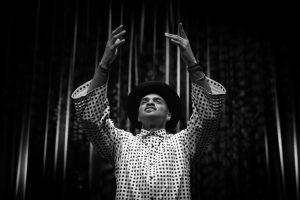
Khari Wendell McClelland, Creative Facilitator
Imaginative. Bold. Genuine. Hopeful. Khari Wendell McClelland is an award-winning musician and creative facilitator who uses the arts and experiential activities for transformational learning.
Based in Vancouver, Canada, Khari has worked with communities across Africa, Australia, Europe, North America and the Caribbean.
In a world with increasingly complex societal challenges, the need for values-based creative solutions is paramount.
Khari helps youth and adults explore core values and creativity as a means to self-actualization, community building and problem-solving.

Tara Mahoney, Research and Engagement Manager
Tara Mahoney is the Research and Engagement Manager with SFU’s Community Engaged Research Initiative (CERi). With over 15 years of experience in community organizing and a PhD in Communication from Simon Fraser University, Tara has been at the forefront of innovative projects that bridge the gap between academic research and community-driven solutions. She teaches climate communications in the Climate Action certificate program at SFU and has published widely on topics related to community-engaged research and public engagement with climate issues. Prior to her role with SFU CERi, Tara was the co-founder and creative director of public engagement agency Gen Why Media, instructor with Civic Innovation Change Lab at RADIUS SFU and the Research Fellow in Climate Change Communications at the David Suzuki Foundation. To learn more about her engagement work and publications visit creativepublics.ca
Approaches to Ameliorate the Impact of Climate Change to Women’s Health in Northern Kenya
EVENT DETAILS
eventDate: Thursday, October 17th, 2024
Time: 6:30PM - 8:00PM
location_onCanfor Room, YWCA Hotel, 733 Beatty St (off Robson), Vancouver, BC
About
The pastoralist communities in Northern Kenya are among the most vulnerable populations to the impact of climate change due to intensifying droughts that are threatening the livelihoods of the people in this region. While climate change has significantly impacted pastoralists communities as a whole, women, in particular, are disproportionately affected by these impacts as they play crucial roles in the livelihoods of their communities. The prolonged series of cyclic droughts have altered traditional livestock production patterns causing shocking levels of food insecurity, waves of inter pastoralists’ communities’ conflicts, and significant health burdens that heavily impacted the wellbeing of the local populations.
In order to address the urgent and live saving needs of vulnerable women who lost their livestock and with very limited sources of livelihoods, a group of community members from Wajir region in Northern Kenya formed and established a community-based organization – ALPC to provide support and help mitigate the pressing climate induced crisis in their own communities.
Using a ground up community-oriented approach, Alternative Livelihoods for Pastoralist Communities (ALPC) identified unmet health needs as a result of the climate crisis as a significant health issue by employing innovative and alternative health solutions for ameliorate the suffering of the vulnerable members of the local community.
ALPC will share the data and lesson learnt of its unique interventions, presents evidence on health outcomes, and engage partners with the aim to build synergies and improve sustainability of the program in the next phases of implementation.
About the Speaker

Yussuf Osman, Program Director from Alternative Livelihoods for Pastoralist Communities (ALPC)
EVENT DETAILS
Date: Thursday, October 17th, 2024
Time: 6:30PM - 8:00PM
Canfor Room, YWCA Hotel, 733 Beatty St (off Robson), Vancouver, BC

Relationships on the Ground: How Community Health Workers Navigate “Community” in Malawi
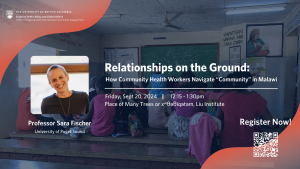
EVENT DETAILS
eventDate: Friday, September 20th, 2024
Time: 12:15 PM - 1:30 PM
location_onLiu Institute for Global Issues
6476 NW Marine Dr, Vancouver, BC, V6T 1Z2, Canada
EVENT DETAILS
Date: Friday, September 20th, 2024
Time: 12:15 PM - 1:30 PM
Liu Institute for Global Issues
6476 NW Marine Dr, Vancouver, BC, V6T 1Z2, Canada
About
Community health workers (CHWs) in Malawi use their positionality—as cultural brokers between communities, NGOs, and the state—to form relationships that make global health work. In mediating program and community goals, CHWs are critical lynchpins in the everyday, unseen work behind global health programs. Without this labor, global community health projects would inevitably fail, as the brokerage role that CHWs undertake is critical to ensure that project goals are effectively translated to communities for uptake.
Fischer uses ethnographic observation and interviews to demonstrate how this work of building relationships, both with community members and with NGO or state-based actors, is an essential but undervalued expertise. This argument pushes the boundaries of how we understand, define, and evaluate “success” in global health programs, while shedding light on the significance of individual and community connections for the achievement of population health.
Hosted by Dr. Veena Sriram, Assistant Professor at the School of Public Policy and Global Affairs and the School of Population and Public Health, in collaboration with the Office of Regional and International Community Engagement.
About the Speaker
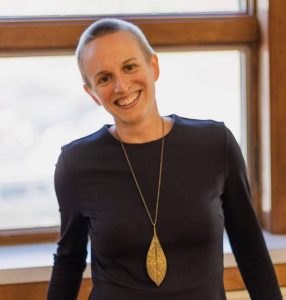
Professor Sara E. Fischer
Sara E. Fischer, PhD, is an Assistant Professor in the Master of Public Health program at the University of Puget Sound. Her research focuses on global health politics, particularly around community health systems and relationships in global health, with her work focusing mainly on Malawi. Formally trained as a political scientist with a background in public health, her scholarship lies at the nexus of global health systems, the politics of health policy and global governance, international development, and the power dynamics of foreign aid relationships.
Community Mental Health Nursing: Evaluation & Policy Impact (2024W UBC-Based)
This program is part of the Global Experiential Education Program (GEEP) and is informed by ORICE values. GEEP aims to strengthen the bridge between classroom learning (theory) and application (practice) to address pressing global issues, in this community-based praxis initiative. Students who participate in GEEP can participate in experiential education projects designed and led by global community partners.
Details at a Glance
Applications Closed
- Program Type: Co-curricular (Not-for-credit)
- Project Type: Community-Engaged Research Project in collaboration with Kamili Organisation
- Placement Location: In-person, UBC-Based
- Duration: 4 months starting in January 2025
- Eligibility: Open to UBC-V Undergraduate (60+ credits) & Graduate students (more details below)
Project Description
Current Project
Kamili Organisation is interested in undertaking an evaluation to understand the impacts of this training for selected nurses once they return to their home site. They would like to understand the facilitators, barriers and impacts the nurses experience when bringing their specialized knowledge to their practice site. The purpose of this evaluation is both to inform the current program and to develop evidence to influence policy at multiple levels/sites in Kenya.
This one-term engagementship (January-April 2025) will be an opportunity to work with the Kamili team to refine the evaluation research questions and design a study that can be implemented in the summer of 2025 or beyond. Activities associated with this project will include a full review of program materials to date, project planning, literature reviews, environmental policy scans, research on impact metrics, evaluation design, methodology reviews and the development of data collection tools.
Background
For 11 years, Kamili Organisation has been offering scholarships for qualified general nurses to come to Kamili for specialized training in mental health. Selected nurses come to Kamili in Nairobi, Kenya for 1 week intensive and receive training on the Kamili model – a community based approach that aims to provide mental health care at a primary level health facility, making services accessible, affordable and sustainable. The newly trained nurses return back to their place of work around the country and become part of a growing network of Kamili-trained nurses with a mental health specialization. This network now comprises 156 nurses in 44 of 47 counties across Kenya. Once trained, the network supports one another and has access to the staff at Kamili for guidance, receives site visits from Kamili leadership and participates in annual training and network development activities.
Organization Details
Kamili Organisation provides affordable mental health services via 30+ clinics across Kenya. Our model clinic in Nairobi provides: accurate diagnosis, treatment, support to patients and their families and psychosocial care in the form of education. We also regularly work with the local community to raise awareness about the symptoms and stigma associated with mental health.
Program Overview
Over a period from January to April 2025, the selected team of students will spend 3-5 hours each week working collaboratively towards completing the objectives of this project. Students will be asked to participate in weekly scheduled in-person meetings (on the UBC Vancouver Campus) to ensure collaboration and accountability goals are defined and met. However, the remainder of the allotted time will be self-directed or in small work teams as per agreements with teammates.
More Information
Applications Closed
- Review project details (please contact ubc.orice@ubc.ca with any questions you may have).
- Next, fill out the ORICE program application form (Qualtrics Survey) below.
- Successful applicants will be contacted by email to continue the selection process through a 15-minute individual interview.
- After interviews, you will be notified of a decision; successful candidates will be sent an offer letter with further details on the program and detailed instructions on how to accept. Your selection into the program includes meeting eligibility requirements, as well as your initial application and your performance in the interview. Student project teams will be comprised of 3-5 students.
Note: Although there are rounds of multiple deadlines scheduled, applications will be reviewed on a rolling basis and we can not guarantee the number of spots remaining in the following round of deadlines. We encourage interested students to apply as soon as possible.
- Be an undergraduate (domestic or international) at the UBC Vancouver campus with 60 or more completed credits, or graduate student as of August 31st, 2024.
- Have access to a reliable internet connection and computer to collaborate with peers & international partners and attend meetings remotely if online meetings are required.
- Demonstrate the ability to think critically and creatively and be willing to take responsibility and initiative to meet project deliverables.
- Prior experience with research design is an asset, but not necessary
- Willingness to have occasional meetings that accommodate time zone considerations for guests joining from Uganda or elsewhere.
Project dates: Week of January 6, 2025, to April 9, 2025
Weekly in-person meetings: TBD - applicants will be asked to be flexible as we will be seeking a weekly standing 2 hour meeting block during M-F, 9am-5pm
Note: Team members need to be available for occasional meetings with the community partner at 8am due to time zone differences.
| Timeline | |
|---|---|
| Applications Open | Wed, August 14, 2024 |
| Round 1 Deadline | Sun, September 15, 2024, 11:59 pm PST |
| Round 1 Short Interviews | September 19 - 24, 2024 |
| Round 1 Offers Made by | September 27, 2024 |
| Round 1 Acceptances Due | Sun, September 29, 2024, 11:59 pm PST |
Funding available for this program: ORICE Experiential Education Accessibility Award
Note: Students may only hold one award at a given time. Please visit our funding page for more information.
